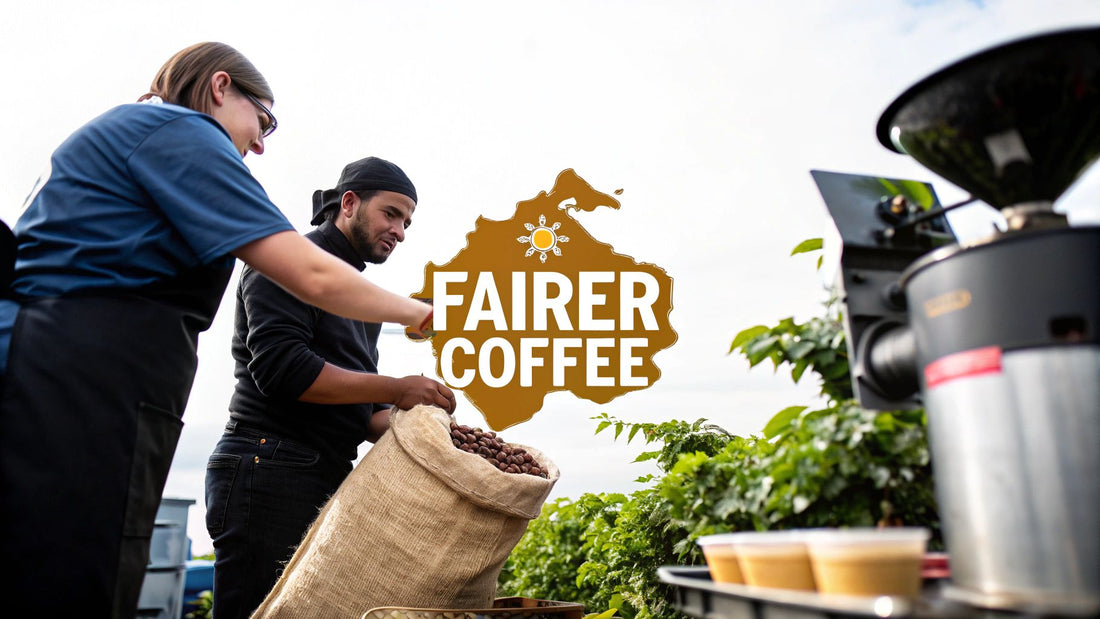
Ethical Coffee Sourcing in the UK: A Guide for Speciality Coffee Drinkers
Share
Imagine your morning coffee as more than just a drink. See it as a connection, a story of fairness that stretches from a farm across the world right to your cup here in the UK. Ethical coffee sourcing isn't just a buzzword; it's a commitment. It’s about ensuring farmers earn a living wage, work in safe conditions, and use methods that are kind to the environment.
Think of it as a handshake of trust between you and the grower.
What Does Ethical Coffee Sourcing Mean?
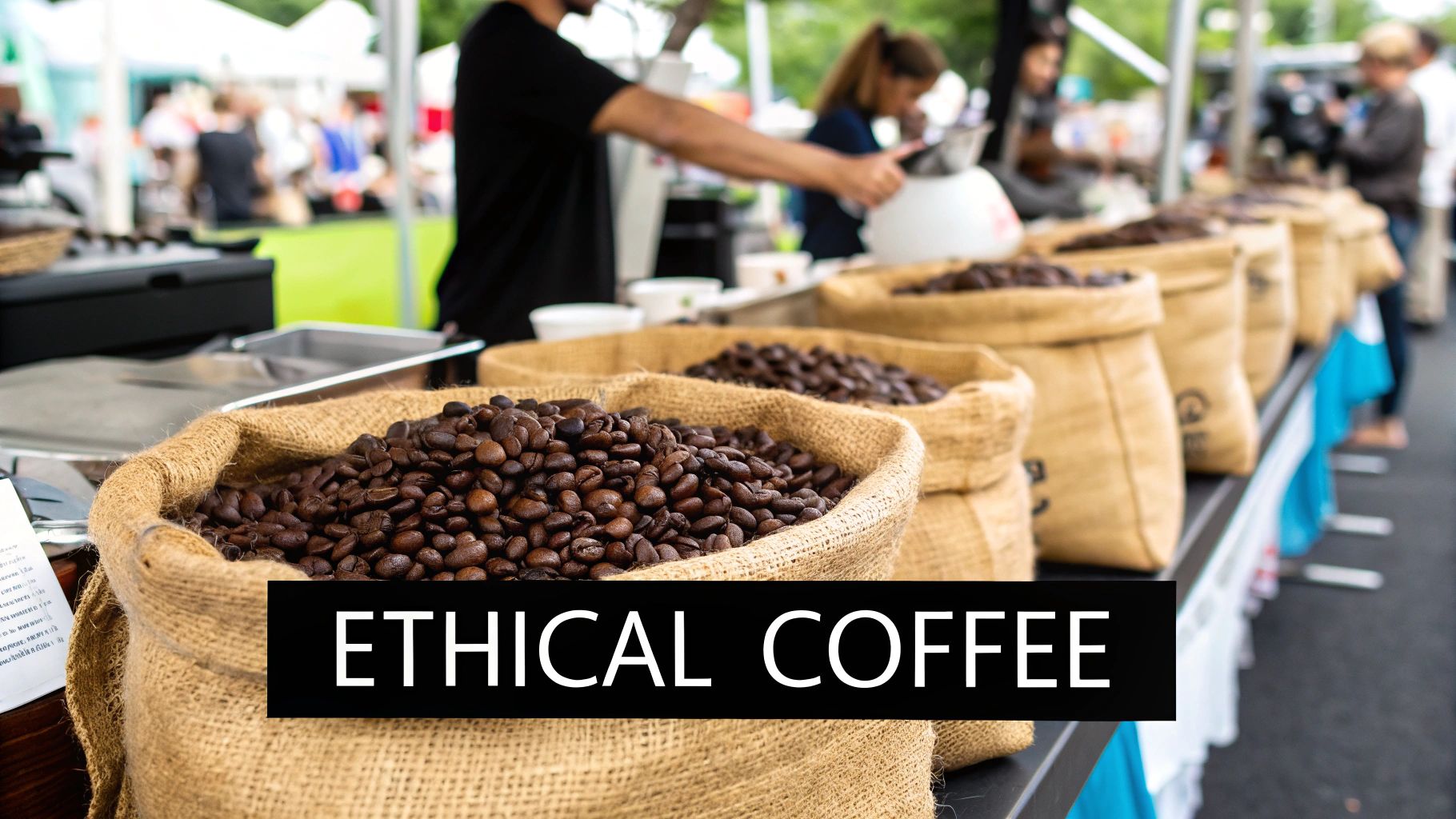
Ethical coffee sourcing is about moving far beyond a simple transaction. It's a whole philosophy built on dignity, fairness, and sustainability, and it completely transforms the journey from bean to cup. At its heart, it’s about acknowledging the real people behind the coffee we all enjoy every day.
This approach means treating coffee farmers and their communities as genuine partners, not just cogs in a supply machine. It champions fair prices that actually cover the cost of production and provide a decent living, empowering families to invest in things we take for granted, like healthcare, education, and their own futures.
The Two Pillars of Ethical Sourcing
Ethical sourcing really stands on two critical pillars: people and the planet. You can't have one without the other. This dual focus creates a powerful, positive cycle where sustainable farming practices and human well-being lift each other up.
On the human side, the goal is to create truly equitable conditions. This includes:
- Fair Payment: Paying a premium price, often significantly higher than the volatile commodity market rates. This provides a crucial safety net and financial stability.
- Safe Working Conditions: Making sure farms are safe environments to work in, completely free from exploitation or forced labour.
- Community Empowerment: Investing back into local communities, sometimes by funding specific projects like building schools or improving local infrastructure.
The core idea is simple: every single person in the supply chain deserves respect and a fair share of the value they help create. Every ethical coffee you buy is a direct vote for a more equitable world.
Protecting Our Planet for Future Generations
The second pillar, environmental sustainability, is every bit as crucial. Let's be honest: when done irresponsibly, coffee farming can lead to deforestation and soil degradation. Ethical sourcing actively promotes methods that protect and even restore fragile ecosystems.
This involves encouraging farming techniques like shade-growing, which helps preserve biodiversity by protecting the natural forest canopy above the coffee plants. It also means reducing the reliance on synthetic pesticides and fertilisers, which protects local waterways and ensures the soil stays healthy for the long haul.
By choosing beans from roasters who are committed to these principles, UK coffee drinkers can directly support a healthier planet. It's a tangible way of ensuring that the beautiful landscapes where our coffee grows will continue to thrive for generations to come, securing the very future of coffee itself.
The UK's Growing Demand for Ethical Coffee
Something is happening in our local cafés and kitchens. Here in the UK, a quiet but powerful shift is taking place. Coffee drinkers are no longer satisfied with just a caffeine hit; they're starting to ask bigger questions. Where did these beans really come from? Who grew them? And were they paid fairly for their hard work?
This curiosity is fundamentally changing the specialty coffee scene. Suddenly, the story behind the cup is just as important as the flavour inside it. UK consumers are voting with their wallets, making ethical coffee sourcing a non-negotiable for any roaster or café that wants to earn their trust and loyalty.
A Conscious Shift in Consumer Habits
This isn't just a fleeting trend. We're seeing a genuine, widespread move toward more conscious consumerism. People are actively seeking out brands that reflect their own values, turning a simple daily habit into a small but meaningful act of support for farmers and the planet. That choice of where to grab your morning flat white now carries real weight.
What’s driving this? A much greater awareness of how complex the global supply chain is. Shoppers are more informed than ever about the immense challenges coffee producers face, from volatile market prices to the devastating effects of climate change. In response, they’re demanding transparency and a real, tangible connection to the source.
Your daily coffee is a direct vote in a global movement. By choosing to support independent, ethically-minded roasters, you’re no longer just a consumer—you become an active participant in building a fairer coffee world.
The Numbers Tell a Story of Progress
The momentum is real, and the data backs it up, though it also shows us how much further we have to go. A huge marker of this change is that around 25% of all coffee sold in the UK is Fair Trade certified. That's a solid base of consumers who actively prioritise fairness. Digging deeper, about one in four UK shoppers now say that sustainability and fair pay are decisive factors when they buy coffee. While this is fantastic, it also highlights the work still needed to bring everyone along. You can explore more data on fair trade consumption in the UK to get the full picture.
The commitment from those already on board is impressive. Nearly 75% of people who buy Fair Trade products are willing to pay more for them—an average of 35% more—to ensure producers get a fair price. It's a brilliant start, but that premium still often falls short of what’s needed to guarantee a true living wage for every farmer. The journey isn’t over.
What This Means for UK Coffee Drinkers
This shift puts an incredible amount of influence right in your hands. Every single time you choose a bag of beans from a roaster committed to ethical principles, you're casting a vote for a better, more equitable industry. Your support allows smaller, independent businesses like ours to keep building direct relationships with farmers, pay them properly, and invest in sustainable practices for the long haul.
It creates a positive ripple effect that benefits everyone involved:
- Farmers get the financial stability they need to invest in their land, their families, and their communities.
- Roasters can source exceptional, unique coffees that tell a powerful and authentic story.
- You, the consumer, get to enjoy a truly outstanding cup of coffee, knowing it was produced responsibly.
Ultimately, the growing demand for ethical coffee in the UK isn't just a fad. It’s a fundamental change in what we value, proving that something as simple as a great cup of coffee can be a powerful force for good in the world.
Decoding Ethical Coffee Labels in the UK
Walking down the coffee aisle in a UK supermarket can feel like trying to decipher a secret language. You’re faced with a wall of bags, each sporting different logos and seals, all vying for your attention. How do you know which ones genuinely align with your values? Making an informed choice is the first step, turning your weekly shop into a powerful statement of support.
These certifications aren't just fancy stickers on a bag; they're promises. Each one represents a unique set of standards and priorities, from guaranteeing a fair wage for farmers to protecting the fragile ecosystems where our favourite beans are grown. Getting to grips with what they stand for empowers you to choose a coffee that doesn’t just taste good, but does good, too.
The Big Three Certifications Explained
While you might spot a few different labels, three main certifications consistently pop up on coffee sold in the UK: Fairtrade, Rainforest Alliance, and Organic. Each tackles ethical sourcing from a slightly different angle, focusing on distinct parts of the people-and-planet puzzle. Understanding their core missions is the key to buying coffee with confidence and a clear conscience.
The image below breaks down the primary focus of each major certification.
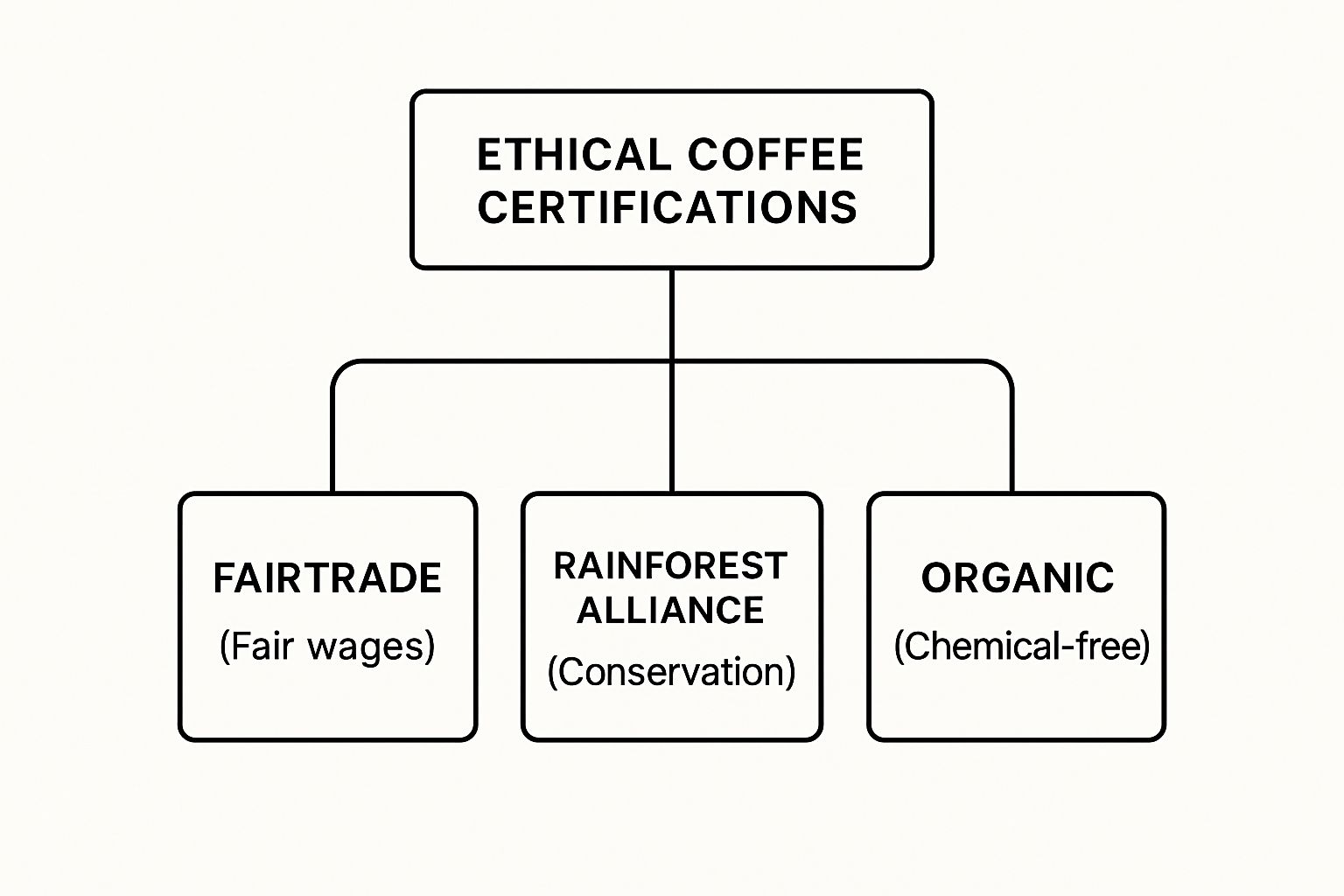
As you can see, they each solve a different piece of the ethical puzzle. Fairtrade centres on farmer wages, Rainforest Alliance on conservation, and Organic on chemical-free farming.
-
Fairtrade: This is probably the most recognised label, zeroing in on the "people" side of ethical sourcing. Its main goal is to fight poverty by making sure producers receive a Fairtrade Minimum Price. Think of it as a vital safety net, protecting farmers from the wild price swings of the global coffee market. It ensures they can cover their costs, plan for the future, and invest back into their communities.
-
Rainforest Alliance: With its distinctive green frog seal, this certification is all about the "planet" pillar. It champions biodiversity, sustainable land management, and the welfare of wildlife. To earn the seal, farms have to meet strict standards for protecting natural resources like waterways and forests, while also ensuring fair treatment and safe conditions for their workers.
-
Organic: The Soil Association Organic symbol is the UK's gold standard for food produced without any artificial nasties. For coffee, this means it was grown without synthetic pesticides, herbicides, or fertilisers. This not only protects the health of the soil but also prevents chemical runoff into local water sources and helps biodiversity thrive on the farm.
It’s useful to see these labels not as competitors, but as different tools working towards a better coffee world. In fact, a coffee can even hold multiple certifications, offering you several layers of assurance.
A UK Shopper's Guide to Ethical Coffee Certifications
To make your decision in the coffee aisle a little easier, it helps to see these certifications side-by-side. Each one offers a distinct guarantee, so the best choice for you really depends on what you want to prioritise with your purchase. Whether your main concern is fair pay for growers or preserving tropical rainforests, there's a certification that aligns with your values.
This table gives you a clear comparison to help you make a quick, informed decision.
| Certification | Primary Focus | Key Guarantees for UK Consumers |
|---|---|---|
| Fairtrade | Farmer Livelihoods & Fair Pay | Producers receive a stable minimum price, protecting them from market volatility and empowering their communities. |
| Rainforest Alliance | Environmental Conservation | Farms protect biodiversity, conserve natural resources like water and forests, and uphold workers' rights. |
| Soil Association Organic | Chemical-Free Agriculture | Coffee is grown without synthetic pesticides or fertilisers, promoting soil health and cleaner ecosystems. |
Ultimately, by understanding what each label means, you can confidently choose a coffee that not only tastes great but also contributes to a more sustainable and equitable future for everyone involved in bringing it to your cup.
Building Stronger Supply Chains with Direct Trade
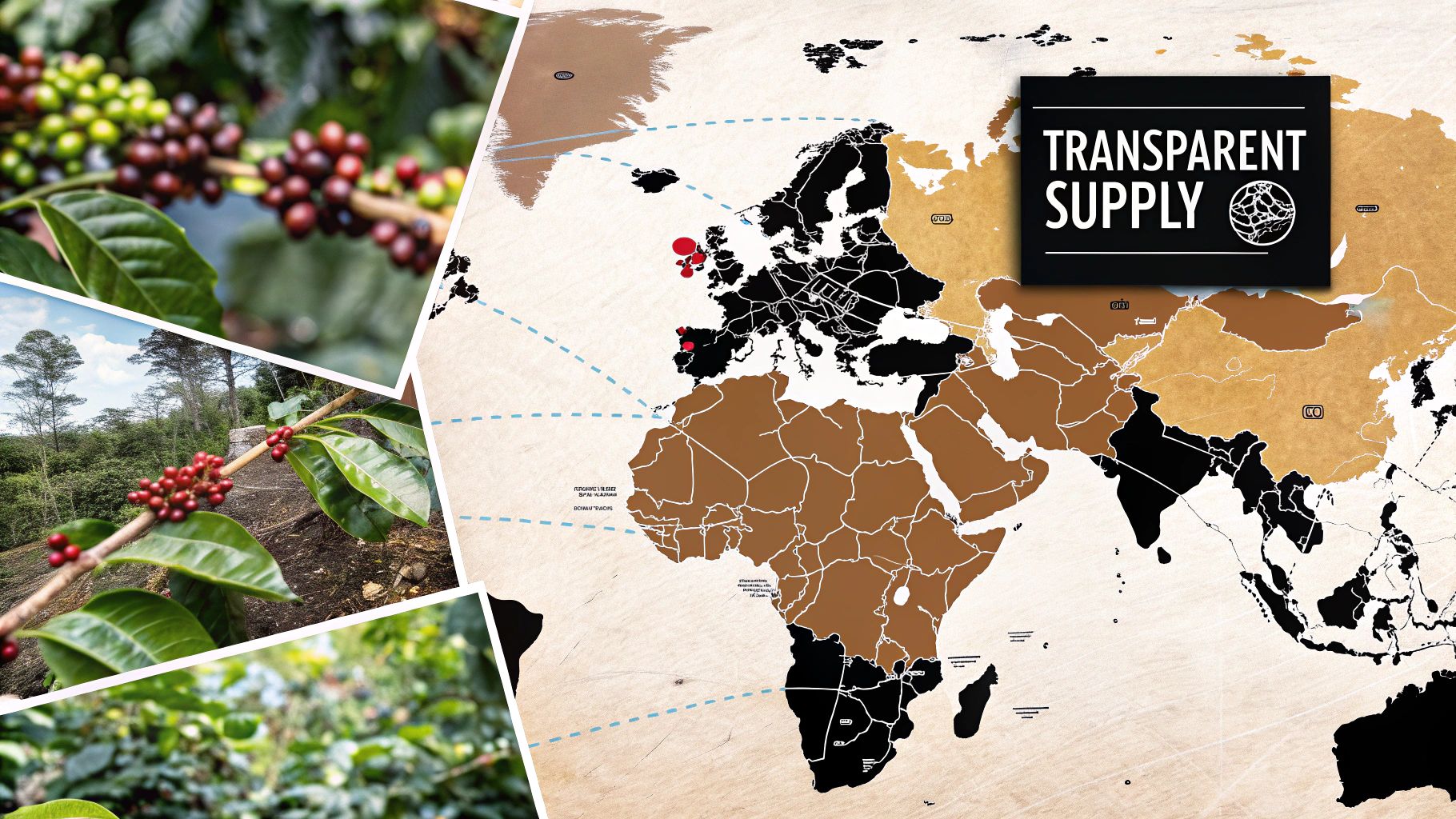
While certifications are a fantastic starting point for ethical coffee sourcing, many UK speciality roasters are pushing the boundaries even further. They’re looking to build deeper, more meaningful connections with the people who actually grow their coffee. This has given rise to a model known as Direct Trade.
Think of it less as a formal system and more as a philosophy built on a simple, powerful idea: personal relationships.
Direct Trade moves beyond logos and checklists. It's about roasters and farmers knowing each other by name, shaking hands at the farm gate, and forging partnerships that can last for years. For many in the UK's speciality coffee scene, this model represents the gold standard for creating a truly transparent and equitable supply chain.
At its heart, Direct Trade is all about shortening the distance between the farm and your cup. Roasters communicate directly with producers, cutting out the many intermediaries that often populate the conventional coffee market. This direct line of communication is where real understanding and mutual respect begin.
From Transaction to Partnership
The real magic happens when the relationship shifts from a simple transaction to a genuine partnership. Instead of just buying a commodity, roasters invest time and resources into visiting the farms they source from. They walk the fields, learn about the local climate, and see firsthand the unique challenges a farming community faces.
This hands-on approach gives a proper understanding of what it really costs to produce exceptional coffee. Roasters aren't just buying beans; they're investing in people and their livelihoods.
A key pillar of this model is paying premium prices that go far beyond even the Fairtrade minimums. It's common for UK roasters to pay between 30% and 150% more than standard commodity prices, directly rewarding farmers for the incredible quality of their harvest. This financial stability empowers producers to invest back into their farms, their families, and their communities in a way that can be genuinely transformative.
Direct Trade is built on the belief that better coffee comes from better relationships. When farmers are treated as valued partners, they are empowered to innovate, improve quality, and produce coffees with character and a story worth telling.
Sparking Innovation at the Source
But these strong partnerships do more than just ensure fair payment—they become catalysts for innovation. When a UK-based roaster and a Nicaraguan farmer collaborate year after year, they can work together to experiment with new processing methods or cultivate different coffee varietals.
This collaborative spirit leads to some incredible results:
- Improved Quality: Farmers get invaluable feedback on their crops, helping them refine their techniques to produce even more exceptional coffee.
- Greater Consistency: Long-term commitments mean roasters can rely on a consistent supply of their favourite beans, and farmers have a guaranteed buyer for their harvest.
- Unique Flavour Profiles: This partnership approach often results in unique micro-lots of coffee that tell a specific story of a place, a person, and a shared vision.
For you, the UK coffee drinker, this translates into a truly special experience. Each cup of Direct Trade coffee carries an authentic story of connection and collaboration. You’re not just tasting notes of chocolate or citrus; you’re tasting the result of a partnership built on mutual respect and a shared passion for amazing coffee.
Choosing coffee sourced this way means you are directly supporting a model that places human dignity and exceptional quality right at its centre. It’s a powerful way to ensure your love for great coffee makes a real, positive impact on the people who make it all possible.
How Ethical Sourcing Shapes the UK Coffee Scene
Ethical sourcing is fast becoming the dividing line in the UK’s competitive speciality coffee market. It’s no longer enough for a coffee to just taste incredible; people want to feel good about where it comes from, too. This has sparked a fascinating shift where principles and profit are starting to go hand-in-hand, proving that doing the right thing can also be a brilliant business model.
This new reality presents a genuine dilemma for coffee lovers across Britain. On one side, you have the big, familiar coffee chains on every corner. Super convenient. On the other, their sourcing practices don't always sit well with a growing number of us who care about the story behind our flat white. This has created a gap that smaller, independent roasters are perfectly placed to fill.
By putting ethical and environmental responsibility at the heart of what they do, these independents aren't just carving out a niche. They are actively changing what consumers expect and showing us all what a fairer, more sustainable coffee future can look like.
The Great British Coffee Dilemma
For many of us, the simple choice of where to grab a coffee can feel surprisingly complicated. The UK coffee shop scene is a perfect illustration of these sourcing challenges, with massive chains dominating the high street but often lagging on their ethical promises. The top three chains alone capture a staggering over 80% of visits, yet some of these same giants rank among the least ethical when you look closely at their sourcing and environmental footprint.
It puts you in a tough spot, forcing a choice between what’s easy and what feels right. In stark contrast, independent coffee shops and smaller, focused chains consistently score higher for their ethical and environmental standards. They're leading the charge. These rankings don’t just look at the beans; they dig into wider issues like single-use cup waste, surcharges for plant-based milk, and whether companies pay their fair share of UK tax. It shows that ethical coffee sourcing in the UK is about a company's entire character. You can explore the full coffee shop rankings to see the breakdown for yourself.
Independents as Pioneers of Change
It’s the smaller, independent coffee roasters and cafés across Britain that have become the real trailblazers of the ethical sourcing movement. They aren't held back by the gigantic, tangled supply chains of multinational corporations, giving them the freedom and passion to build their businesses on a solid ethical foundation right from the start.
For these businesses, ethical sourcing isn't just a clever marketing line; it's woven into their DNA. They often forge direct relationships with farmers, pay prices far above the commodity market rate, and champion transparency every step of the way. This resonates deeply with a growing number of UK coffee drinkers who are actively looking for brands they can trust.
The success of these independent businesses sends a clear message to the wider industry: a deep-seated commitment to ethical coffee sourcing is not a barrier to growth, but a catalyst for it. It proves that profit and purpose can, and should, go hand-in-hand.
This, in turn, inspires a new wave of coffee entrepreneurs to place fairness and sustainability at the very centre of their plans. As more roasters and cafés embrace this philosophy, they collectively raise the bar for the entire UK coffee scene. They’re proving that a business model built on respect for people and the planet isn't just possible—it's essential for long-term success in a market where customers demand a story they can believe in.
Putting Ethical Sourcing into Practice
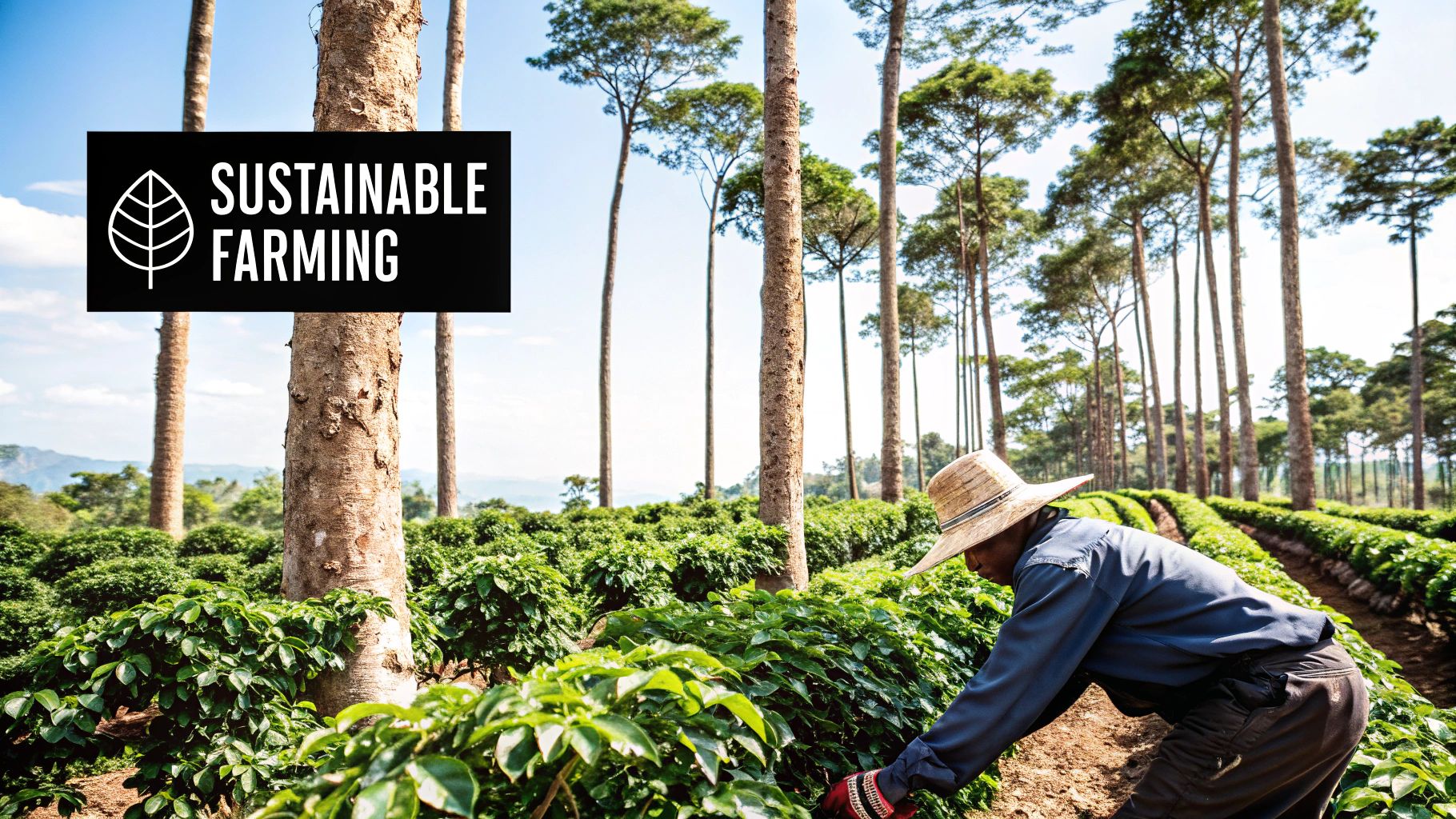
It’s one thing to talk about the theory of ethical coffee sourcing, but seeing it in action is where the real magic happens. A true commitment to fairness and sustainability isn’t just a page in a company handbook; it’s a living practice, reflected in every decision about how coffee is chosen, bought, and roasted. It’s about building a supply chain with a conscience.
For roasters who are serious about this, it means choosing sourcing methods that put transparency and human connection first. It’s about moving beyond simple transactions to build direct trade relationships that feel more like genuine partnerships. This is how principles become tangible proof of a better way of doing business.
A story from one of our partner farms paints a perfect picture. For generations, a small family-run estate in Nicaragua sold its incredible crop to a local co-op for a low, unpredictable price. Through a direct partnership with a UK roaster, they now get a premium for their beans—often over 50% higher than the standard market rate. They also get feedback that helps them refine their growing techniques, which has given them the stability to invest in better equipment and send their children to school.
A Tangible Impact You Can Taste
This isn't just a heart-warming tale; it has a direct effect on the coffee in your cup. When farmers have financial security and a collaborative partner, they can afford to focus on quality. This empowers them to produce beans with the kind of unique, incredible flavour profiles that would otherwise be lost in bulk commodity bags. When you taste that coffee, you’re tasting the result of a respectful, sustainable partnership.
By seeking out and supporting roasters genuinely dedicated to this model, you are not just buying coffee. You are actively participating in building a fairer, more sustainable coffee future for everyone.
This collaborative approach is really starting to catch on. The growth of UK-based coffee businesses known for their ethical sourcing shows there's a real market for responsible coffee. As these companies grow, they influence what consumers look for and can help steer major changes in how coffee farmers are treated across the globe.
A Holistic Commitment to Doing Good
This dedication to doing the right thing often goes far beyond the coffee beans themselves. A commitment to ethical standards tends to ripple through every part of a business, including its environmental footprint. From using fully recyclable packaging to implementing sustainable business practices in the roastery and office, it’s all part of a holistic approach to responsibility.
This is a brilliant example of how the speciality coffee market in the UK is changing for the better, driven by businesses and coffee lovers who genuinely care. It's an inspiring call to action for every single one of us: choose brands that champion transparency and fairness. Your choice has real power.
Frequently Asked Questions About Ethical Coffee
Dipping your toes into the world of ethical coffee can sometimes feel a little overwhelming. It's a space filled with new terms and big ideas. To help you feel completely confident in your choices, we’ve put together answers to a few common questions we hear from UK coffee drinkers.
Think of this as a quick guide to understanding fairness, transparency, and the real power you hold in your hands with every single cup.
Does Ethically Sourced Coffee Always Cost More?
It’s true that some ethically sourced coffees come with a slightly higher price tag, but it helps to reframe this. It's less of an extra cost and more of a direct investment in a much fairer, higher-quality system.
That small premium makes a world of difference. It goes straight towards supporting proper wages for farmers, funding community essentials like schools and healthcare, and promoting sustainable farming practices that protect our planet for the long haul.
Plus, many independent UK roasters work hard to keep pricing competitive. When you weigh it against a daily coffee shop habit, buying a bag of exceptional, ethically sourced beans to brew at home is often far more economical. You get a superior coffee and a clear conscience, sometimes for less.
How Can I Verify a Brand's Ethical Claims?
This is a great question. The best way is to look for genuine transparency that goes beyond the marketing buzzwords on the packaging. Official, third-party certifications like Fairtrade or Rainforest Alliance are an excellent starting point because they are independently audited and verified.
For roasters who champion Direct Trade, their website is your best friend. Here’s what to look for as signs of real authenticity:
- Detailed Farm Stories: Do they share specifics about the farms, the regions, and—most importantly—the people who grew the coffee?
- Transparency Reports: Some of the best roasters publish annual reports detailing the exact prices they paid for their green coffee. This is the gold standard of accountability.
- Sourcing Trip Information: Are they sharing photos, videos, or stories from their visits to coffee-producing countries?
A truly ethical brand is immensely proud of the relationships they’ve built. They’ll be excited to share the details with you. If you find it hard to track down this kind of information, it’s fair to question how deep their claims really go.
What Is the Most Important Factor in Choosing Ethical Coffee?
If you have to boil it down to one thing, it’s transparency.
Whether it’s backed by a formal certificate or a detailed Direct Trade story, you should be able to trace your coffee’s journey. A transparent company will openly tell you where their beans are from, who grew them, and what they’re doing to ensure fairness all the way through the supply chain.
Choosing to support UK brands that are open and honest about their sourcing is the single most powerful way to champion the ethical coffee movement.
Can My Small Purchases Really Make a Difference?
Absolutely. It’s easy to feel like one person can’t change much, but you should never underestimate the power of your daily choices.
Every single time you intentionally choose an ethically sourced coffee, you’re casting a vote. You’re sending a clear, powerful message to the entire industry that you value fair wages, environmental protection, and a more sustainable coffee world for everyone.
Taken together, these individual choices create the market demand that pushes more roasters and cafés across the UK to adopt better practices. Your daily cup really does contribute to a global wave of positive change.
At Ue Coffee Roasters, we live and breathe these principles every day. Our commitment to ethical sourcing and building direct, lasting relationships with our farming partners is at the heart of everything we do. Explore our range of exceptional, responsibly sourced coffees and discover a taste that’s as good for your conscience as it is for your palate.
